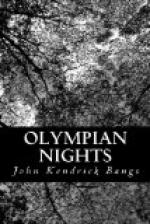“Never tasted such a steak!” I said, as the delicate morsel actually melted like butter in my mouth.
“No, sir, you never did,” Memnon agreed. “It is cut from the steer bred for the sole purpose of supplying Jupiter and his family with tenderloin. We take the calf when it is very young, sir, and surround it with all the luxuries of a bovine existence. It is fed on the most delicate fodder, especially prepared by chemists under the direction of AEsculapius. The cattle, instead of toughening their muscles by walking to pasture, are waited upon by cow-boys in livery. A gentle amount of exercise, just enough to keep them in condition, is taken at regular hours every day, and at night they are put to sleep in feather beds and covered with eiderdown quilts at seven o’clock.”
“Don’t they rebel?” I asked. “I should think a moderately active calf would be hard to manage that way.”
[Illustration: CARING FOR THE CALVES]
“Oh, at first a little, but after a while they come to like it, and by the time they are ready for killing they are as tender as humming birds’ tongues,” said Memnon. “If you take him young enough, you can do almost anything you like with a calf.”
It seemed like a marvellous scheme, and far more humane than that of fattening geese for the sale of their livers.
“And this coffee, Memnon? You said it was fresh from the dairy of the gods. You get your coffee from the dairy?” I asked.
“The breakfast coffee—yes, sir,” replied Memnon. “Fresh every morning. You must ask the steward to let you see the cafe-au-lait herd—”
“The what?” I demanded.
“The cafe-au-lait herd,” repeated Memnon. “A special permit is required to go through the coffee pasture where these cows are fed. Some one, who had a grudge against Pales, who is in charge of the dairymaids, got into the field one night and sowed a lot of chicory in with the coffee, and the result was that the next season we got the worst coffee from those cows you ever tasted. So they made a rule that no one is allowed to go there any more without a card from the steward.”
“You don’t mean to say—” I began.
“Yes, I do,” said Memnon. “It is true. We pasture our cows on a coffee farm, and, instead of milk, we get this that you are drinking.”
“Wonderful idea!” said I.
“It is, indeed,” said Memnon; “that is, from your point of view. From ours, it does not seem so strange. We are used to marvels here, sir,” he continued. “Would you care for anything more, sir?”
“No, Memnon,” said I. “I have fared sumptuously—my—ah—my appetite is somewhat taken away by all these tremendous things.”
“I will have an appetite up for you, if you wish,” he replied, simply, as if it were the easiest thing in the world.
“No, thank you,” said I. “I think I’ll wait until I am acclimated. I never eat heavily for the first twenty-four hours when I am in a strange place.”




